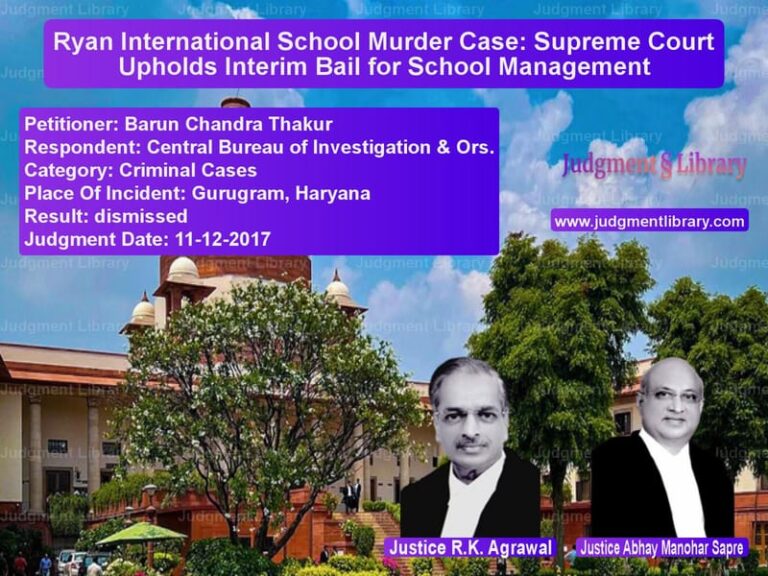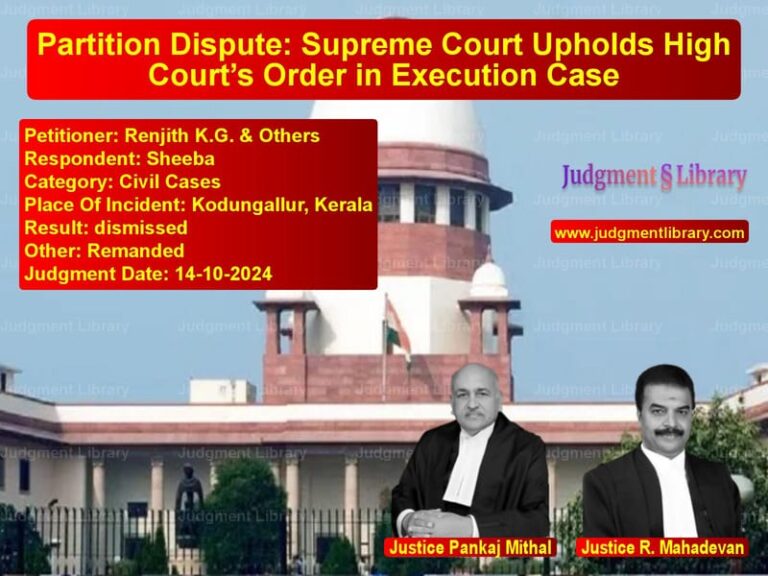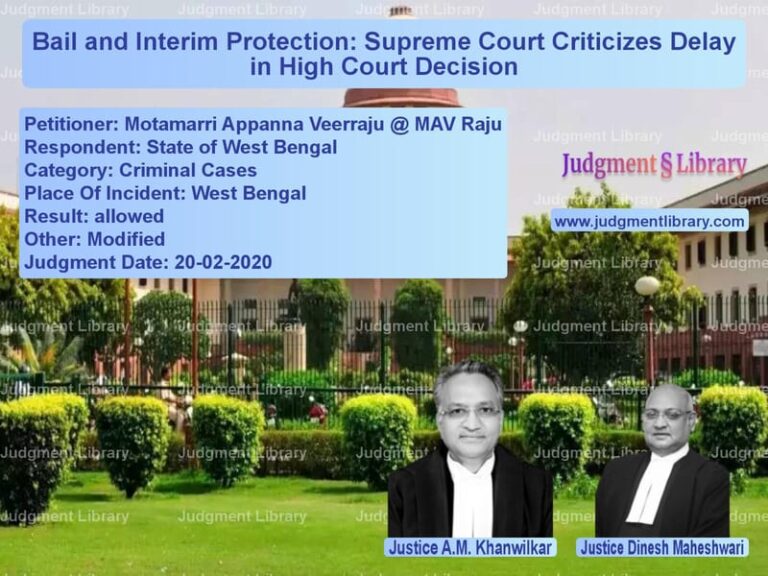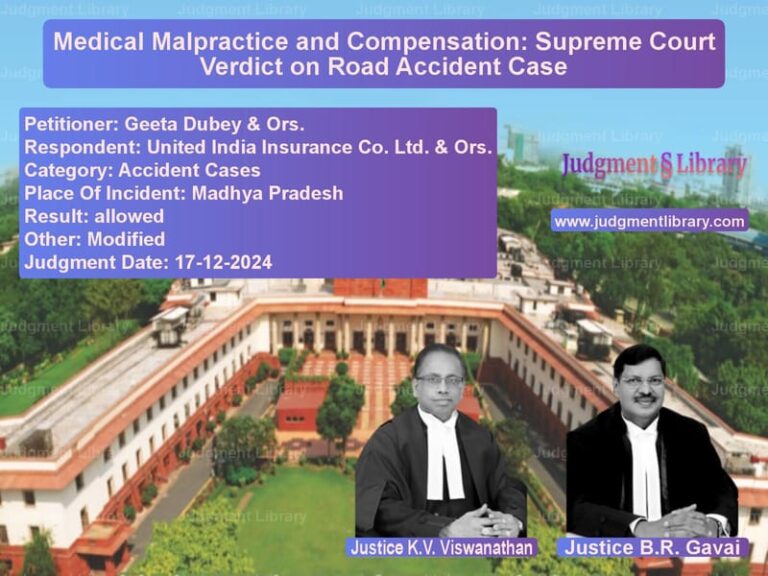Taxation of Deemed Dividend: Supreme Court Interprets Section 2(22)(e) of Income Tax Act
The case of National Travel Services vs. Commissioner of Income Tax, Delhi involves a crucial question of tax law interpretation under Section 2(22)(e) of the Income Tax Act, 1961. The dispute revolves around whether loans or advances given by a company to its shareholders or concerns in which shareholders have substantial interests should be considered as deemed dividends.
This case has significant implications for taxation in corporate structures where funds are transferred between closely held companies and their shareholders. The Supreme Court, in its judgment dated January 18, 2018, examined this issue in detail.
Background of the Case
The appellant, National Travel Services, is a partnership firm consisting of three partners:
- Naresh Goyal (35% share)
- Surinder Goyal (15% share)
- M/s Jet Enterprises Private Limited (50% share)
The firm had taken a loan of Rs. 28.52 crores from Jetair Private Limited. In this company, the appellant had subscribed to equity capital in the names of two partners, Naresh Goyal and Surinder Goyal, who together held 48.19% of the shareholding. However, they held these shares as beneficial owners for and on behalf of the firm.
The Income Tax Department treated the loan amount as deemed dividend under Section 2(22)(e) of the Income Tax Act, arguing that since the partners were shareholders, the firm effectively received an advance, which should be taxed as deemed dividend.
Legal Issue
The primary question before the court was:
“Whether the provisions of Section 2(22)(e) of the Income Tax Act apply to loans given to a firm in which the shareholder has a substantial interest?”
The ruling required an interpretation of whether the phrase ‘beneficial owner’ of shares includes firms that are not directly registered as shareholders.
Petitioner’s Arguments (National Travel Services)
The appellant contended that:
“Section 2(22)(e) applies only to registered shareholders and not to beneficial owners of shares. Since the firm is not a shareholder in the company’s register, the provision should not apply.”
They relied on previous Supreme Court rulings, including CIT vs. C.P. Sarathy Mudaliar (1972), which held that deemed dividend only applies to registered shareholders.
Respondent’s Arguments (Income Tax Department)
The Income Tax Department argued:
“The amendment to Section 2(22)(e) in 1988 included beneficial shareholders who hold more than 10% voting power. Since the firm holds shares through its partners, it is a deemed shareholder, and the loan qualifies as deemed dividend.”
They referred to legislative intent, which aimed to curb tax avoidance by preventing closely held companies from distributing profits as loans instead of dividends.
Supreme Court’s Analysis
The Court examined the historical development of the provision:
- Under the Income Tax Act, 1922, deemed dividend only applied to registered shareholders.
- In 1988, Section 2(22)(e) was amended to include beneficial owners holding at least 10% voting power.
- The phrase “any concern in which such shareholder has a substantial interest” was also introduced, expanding the scope of deemed dividend.
The Court observed:
“The expression ‘such shareholder’ in the second limb of the provision refers back to a shareholder under the first limb. Therefore, a person must be both a registered and beneficial shareholder for the provision to apply.”
Key Ruling
The Court held that:
- A firm is not a shareholder merely because its partners hold shares.
- Loans given to firms where partners hold shares do not qualify as deemed dividends unless the firm itself is a shareholder.
- The legislative amendment does not override the requirement that a shareholder must be both registered and beneficial.
Implications of the Judgment
This ruling has significant implications for corporate taxation:
- Limited Application of Deemed Dividend: The judgment clarifies that loans given to firms cannot be taxed as deemed dividends unless the firm itself is a registered shareholder.
- Beneficial Ownership Alone is Not Enough: The ruling restricts the Income Tax Department’s ability to tax firms merely because their partners own shares in a lending company.
- Prevents Unjust Taxation: Businesses structured as partnerships with shareholding in group companies will not be unfairly taxed under Section 2(22)(e).
Conclusion
The Supreme Court’s ruling in National Travel Services vs. Commissioner of Income Tax provides clarity on the application of deemed dividend taxation. The judgment protects firms from arbitrary tax claims and reinforces that only registered shareholders are subject to deemed dividend provisions.
This decision strengthens the principle that tax laws must be interpreted strictly, ensuring fairness in corporate taxation while preventing misuse of loopholes.
Don’t miss out on the full details! Download the complete judgment in PDF format below and gain valuable insights instantly!
Download Judgment: National Travel Serv vs Commissioner of Inco Supreme Court of India Judgment Dated 18-01-2018.pdf
Direct Downlaod Judgment: Direct downlaod this Judgment
See all petitions in Income Tax Disputes
See all petitions in Tax Evasion Cases
See all petitions in Banking Regulations
See all petitions in Judgment by Rohinton Fali Nariman
See all petitions in Judgment by Navin Sinha
See all petitions in allowed
See all petitions in Modified
See all petitions in supreme court of India judgments January 2018
See all petitions in 2018 judgments
See all posts in Taxation and Financial Cases Category
See all allowed petitions in Taxation and Financial Cases Category
See all Dismissed petitions in Taxation and Financial Cases Category
See all partially allowed petitions in Taxation and Financial Cases Category







